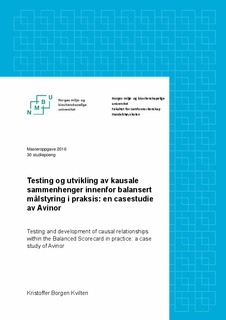| dc.contributor.advisor | Korhonen-Sande, Silja | |
| dc.contributor.author | Kvilten, Kristoffer Borgen | |
| dc.date.accessioned | 2016-08-23T13:31:06Z | |
| dc.date.available | 2016-08-23T13:31:06Z | |
| dc.date.issued | 2016-08-23 | |
| dc.identifier.uri | http://hdl.handle.net/11250/2401161 | |
| dc.description.abstract | Temaet for denne masteroppgaven er testing og utvikling av årsak-virkning-sammenhenger innenfor
balansert målstyring. Balansert målstyring er et verktøy for strategisk virksomhetsstyring som har
vunnet stor utbredelse i både privat og offentlig sektor. Et av hovedelementene i balansert målstyring
er strategikartet, der strategiske delmål plasseres i en årsak-virkning-sammenheng (kausal
sammenheng) som samlet sett skal beskrive virksomhetens strategi og verdiskapningsprosess. Hvert
strategiske delmål er representert med en eller flere styringsparametere, og gjennomføringen av
strategiske initiativer skal sette virksomheten i stand til å kunne nå de strategiske delmålene.
Mye tyder på at mange virksomheter sliter med å utnytte informasjonen de får fra sitt målstyringssystem. En av hovedårsakene til dette er at man mislykkes med å utvikle og validere de antatte årsakvirkning-sammenhengene i målstyringssystemet. Der forskningslitteraturen understreker viktigheten
av at man utvikler og tester disse sammenhengene, så synes både konsulenter og praktikere å nedtone
dette aspektet. Det er imidlertid lite forskning som har sett på hvordan virksomheter arbeider med
dette i praksis. Formålet med denne oppgaven er derfor å belyse hvordan en virksomhet som benytter
balansert målstyring arbeider med å utvikle, teste og videreutvikle årsak-virkning-sammenhengene i
sitt målstyringssystem.
For å kunne belyse dette har jeg tatt utgangspunkt i eksisterende forskning, og forsøkt å identifisere
hva som er best practice i utvikling, testing og videreutvikling av årsak-virkning-sammenhengene i
balansert målstyring. Dette har dannet grunnlaget for teoretiske proposisjoner som beskriver best
practice for denne prosessen. Videre har det blitt gjennomført dybdeintervjuer av tre ansatte som
sitter tett på bruken av balansert målstyring i Avinor, som er en stor norsk virksomhet som benytter
balansert målstyring. Intervjuene har blitt supplert med sekundærdata som styringskort, strategikart
og handlingsplaner. Resultatene fra datainnsamlingen har deretter blitt sammenlignet med de
teoretiske proposisjonene.
Funnene indikerer at de mange årsak-virkning-sammenhengene som ligger til grunn for balansert
målstyring kan være problematiske. Det er et betydelig avvik mellom de teoretiske proposisjonene og
måten Avinor arbeider med utvikling, testing og videreutvikling av årsak-virkning-sammenhengene i
sitt målstyringssystem. Avinor har store utfordringer når det kommer til sammenhengen mellom de
strategiske delmålene. De finner det til tider utfordrende å etablere utsagnskraftige styringsparametere, og informasjonen fra målstyringssystemet benyttes i varierende grad i prioriteringen av
strategiske tiltak. Årsak-virkning-sammenhengene testes ikke i det hele tatt ved hjelp av kvantitative
metoder, og i den grad sammenhenger testes, så er det ved hjelp av kvalitative vurderinger. | nb_NO |
| dc.description.abstract | This master’s thesis studies testing and development of causal relationships within the Balanced
Scorecard. The Balanced Scorecard is a strategic performance management system used extensively
in both private and public sector. A key element of the Balanced Scorecard is the strategy map where
strategic objectives are linked in a causal relationship that is supposed to describe the organizations
strategy and value creation process. One or more key performance indicators represent the strategic
objectives. The purpose of the strategic initiatives is to enable the organization to achieve their
strategic objectives.
It is suggested that few organizations fully utilize the information they get from their performance
management system. One of the main reasons for this is that they fail to develop and validate the
hypothesis of the causal relationships in their management system. Research literature emphasise the
importance of developing and testing these relationships. However, both consultants and practitioners
seem to fade down the importance of this aspect. Few studies have examined how organizations are
developing and testing the causal relationships in practice. Hence, the purpose of this study is to
examine how an organization that has implemented the Balanced Scorecard is developing, testing and
evolving the causal relationships within their management system.
To examine this issue I have tried to identify best practice for developing, testing and evolving the
causal relationships within the Balanced Scorecard based on existing research. This has formed the
basis for theoretical propositions describing best practice for this process. Further, I have conducted
individual interviews with employees working with the Balanced Scorecard in Avinor, a large
Norwegian public company using the Balanced Scorecard. Secondary data like scorecards, strategy
maps and an action plan have supplemented the interview data. The results from the data collection
have been compared with the theoretical propositions.
The results indicates that the many causal relationships within the Balanced Scorecard could be
problematic. There is a considerable discrepancy between the theoretical propositions and the way
Avinor is developing, testing and evolving the causal relationships within their management system.
Avinor is having difficulties establishing the causal relationship between the strategic objectives. They
find it difficult to establish key performance indicators that is truly representing the strategic objectives
and the information from the scorecard is used only to a certain degree in prioritizing strategic
initiatives. They do not use quantitative methods in the testing of the causal relationships and if there
is any testing of the causal relationships, it is based on qualitative evaluations. | nb_NO |
| dc.language.iso | nob | nb_NO |
| dc.publisher | Norwegian University of Life Sciences, Ås | |
| dc.title | Testing og utvikling av kausale sammenhenger innenfor balansert målstyring i praksis : en casestudie av Avinor | nb_NO |
| dc.title.alternative | Testing and development of causal relationships within the Balanced Scorecard in practice: a case study of Avinor | nb_NO |
| dc.type | Master thesis | nb_NO |
| dc.subject.nsi | VDP::Social science: 200::Economics: 210::Business: 213 | nb_NO |
| dc.source.pagenumber | 70 | nb_NO |
| dc.description.localcode | M-ØA | nb_NO |
